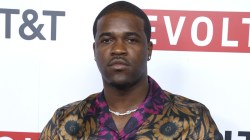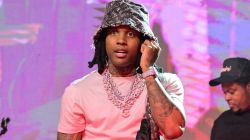Mistah FAB may just be too candid for his own good. During the course of a 45-minute conversation he’ll sound off on things such as his childhood, community outreach and the general state of Hip Hop so much, that the details of his upcoming album are almost relegated to a footnote. He’s literally giving away hundreds of turkeys, thousands of coats and coordinating a toy drive for the holiday season, and oh-by-the-way, he just so happens to be working on an album that he compares to “an out of body experience.”
Ultimately, maybe people will not only recognize his emcee skills but also take note of his marketing and networking abilities. They probably should. The fact that he rounded up Talib Kweli, Royce Da 5’9, Jadakiss and Noreaga, despite independently releasing I Found My Backpack 2: The Lost Notebook via Faeva Afta and not through a lucrative P and D deal like the one he formerly had with Atlantic speaks volumes about where he’s at right now. The question is, are listeners at a point where they can also appreciate his growth. The media has a way of taking advantage of his candor when FAB is talking about V-Nasty dropping N-bombs, and then disappearing when FAB is using that same candor to address homelessness, poverty or Oscar Grant. Now that the December 6 release of I Found My Backpack 2 is here, perhaps everyone—maybe even FAB too—will find out what it is they really value in Hip Hop.
HipHopDX: A lot of people first saw you within the context of “Ghost Ride It.” But there’s a different perception that comes along with naming your project I Found My Backpack 2. How has that perception changed?
Mistah FAB: People consider me a relatively new artist. Some of those people don’t even know me, because Hip Hop changes every six months…every six days it seems like. So there are people that may have been familiar with me through the Hyphy or the “Ghost Ride It” days, and they haven’t given these new projects the time of day. And there are also people that are only familiar with these new projects and just feel like, “What’s next?” Then there are fans that heard me before “Ghost Ride It,” and they’re super happy I’m back to making this kind of music. Fortunately, to be 29-years-old and have so many changes in my career thus far, I’ve been able to maintain some type of relevance in today’s constantly changing game. That’s a blessing. So I’m just happy to still have a career and an outlet, because I’ve seen people come and go.

AD LOADING...
DX: When you talk about a backpacker and just the general perception that comes with the term, is this series a calculated move to appeal to that audience?
Mistah FAB: Not with me, I’m just building my catalogue man. I’m privileged enough to own everything I’ve ever recorded. When it comes to my projects, I own all my own music. I just like creating new content, experimenting, branching off and trying new styles. I’m more of a musician than a rapper. I love music, art and the artistry. And to be a part of that is great. Some people are only known for one thing. But when you ask people about me, they know me from so many different things. That’s humbling in it’s own right.
DX: With you being so versatile, do you get frustrated when people try to limit you strictly to the Hyphy or Backpacker set?
Mistah FAB: Always. Versatility and diversity is life’s biggest curse as well as life’s biggest blessing. The curse comes because in today’s game, everybody sounds the same. And everyone feels if you don’t sound like the hot song that’s out right now, then you’re not popular. If you’re not rapping about weed, how many people you’ve killed or how many cars you have, then that’s not the in thing. Unfortunately, we have a lot of fair-weather fans that are only interested in the in thing.

AD LOADING...
In high school, you had the in-crowd, you had the outsiders and then you had the outsiders. The outsiders never did what the in crowd did. They just kind of did their own thing, but they were still cool. So that’s the curse and the blessing. You have the ability to do so much, but people only wanna hear one thing. They’re like, “Yo, when I listen to this album I know this is what I’m gonna get.” Hip Hop used to be the surprise at the bottom of the Cracker Jack box—you never knew what you were going to get. I loved saying, “I might listen to so-and-so and be totally surprised.” That’s why you have to take you hat off to brothers like Kendrick Lamar, Drake and many of these other artists. You don’t know if they’re going to sing, or if they’re going to rap or who the featured artists might be. It’s different, and that’s what I respect.
DX: How do you draw that line between being versatile enough to adapt to different climates versus compromising your sound?
Mistah FAB: I’ve never had a job in my life…ever. Everything has always been strictly music. It hasn’t been some side hustle where I was selling dope here or robbing people. Everything’s music. From writing for myself and other people to selling CDs out of the trunk of my car or whatever else it may be. Music has allowed me to enjoy sustainable living. My sustainability has come from my hustle. That’s why I say, “Grind King,” I’m serious about that. I grind by all means. There’s nothing in music that I’m not willing to do except compromise my integrity.
DX: I want to briefly step away from the music and talk about that integrity. You were very influential in bringing awareness to both the Oscar Grant situation and Occupy Oakland. But the biggest thing people wanted to talk about was your opinion on V-Nasty using the word “nigga.” Why do you think that is?

AD LOADING...
Mistah FAB: People are always drawn to negativity. Unfortunately we live in an environment that revolves around drama. There was once a time when positivity stood out, and negativity would be forced out. “Sportscenter” wouldn’t be “Sportscenter” if it was all bloopers…you know what I’m saying? Nowadays, it’s flipped and people only want to hear about the negative things. The same day a black president is elected is the same day a website puts up a blog of a man killing someone. And that blog of the killing got more YouTube views than the inauguration speech.
Once a month, I do a charity event in my neighborhood but no one highlights that. I did a blog about Oscar Grant getting killed on January 2—the day after he got killed—and that blog got 40,000 views. A week later, I did a blog about my chain getting snatched, and it had over a million views. People said, “Oh, you did the blog about your chain getting snatched for attention.” No. What I did was make a mockery out of the ignorance that we’re attracted to. You want to hear about a rapper getting his chain snatched, but you don’t care about an innocent black man getting assassinated by a white, armed officer in front of thousands of people? That’s not important to them. So the things that are truly important have little value in today’s game—especially in Hip Hop. And that’s very unfortunate.
DX: Is that why you’re so open about everything in your life?
Mistah FAB: With me man, my life is an open book. Unlike a lot of these other artists and entertainers, I have nothing to hide. I wasn’t ashamed that my mother died from cancer and that my dad died from AIDS. I’m a proud father, so I tweet pictures of my daughter and the things that I do with her. I couldn’t tweet pictures of my dad; my dad was in jail. When people follow me on Twitter, they’re like, “Man you be wilding out.” Nah, I just be saying some real shit.

AD LOADING...
There might be days where I’m wild, and it’s very entertaining. But I’m an entertainer, and my life is entertaining. One thing you can’t deny is that I’m honest. You’ll never be able to say I’m not honest, even if it hurts me. I don’t like the taste of blood, so I don’t believe in biting my tongue. I might say some crazy shit, but it is what it is. I stand firmly on the decisions that I make. And as a man, I can admit if those decisions are wrong.
I was at Drake’s video shoot the other day, and we saw Lil Wayne. So people were asking me to go say what’s up to him. And I was like, “I said some shit about [Lil Wayne] on the blog, so I’d look fake as fuck if I walked over there and was like, ‘Yo what up?’” Instead of [being fake], I just didn’t say anything. To me, that would have been fake as fuck to walk over there and be like, “Hey, what up Wayne? It’s FAB!” He probably would’ve been like, “Ain’t you the same nigga that was talking bad about me when I went to jail?” And I was wrong for that. I can admit that. You can’t say those things until you’ve actually walked in someone else’s shoes. What would you do? I was wrong for even speaking on that, but I’m man enough to admit that.
DX: The pictures of you, Drake and E-40 were on nearly every blog and website. Was that as big of a deal as we made it out to be?
Mistah FAB: I’ve been knowing Drake for a long time, so he reached out. He called me like, “Yo, I’m in The Bay Area, nigga. I’m shooting a video tomorrow…come fuck with me. It’s gonna be good.” It’s just representation, man. I told Drake that Mac Dre was like my Lil Wayne. [Mac Dre] was the dude that put me on and put me in this position, so [Drake] shouting him out was very respectable. We appreciate that. So for him to reach out and have some reputable faces in that video just shows you how good of a dude he is. I’ve always cut for him, and I’ll always be a supporter. Outside of the music, he’s a hell of a guy.

AD LOADING...
DX: That kind of camaraderie is great. But how do you mix that spirit—or even all the featured guests on I Found My Backpack 2 with your competitive spirit?
Mistah FAB: People ask me why I spread myself so thin, because I’m always doing collaborations and stuff. My thing is: leave your legacy behind on every song, have fun, rap your ass off and do what you do. I want to be able to rock with everybody. But I’m very competitive. Every song I get on, I want to go hard and outdo what I did the last time—especially when I get on these features with big name artists.
DX: We began by talking about your growth. As a businessman, what are the most important lessons you’ve learned from the radio situation with KMEL and your deal with Atlantic?
Mistah FAB: That’s a great question. With Atlantic, I just recently began admitting in public that I wasn’t mature enough to for the deal they gave me. They gave me a label deal, and at that time I was very much in artist mode. The difference between the two is that you bear a lot more of responsibility. It’s easy to say you’re a CEO when you’re dealing with a $100 budget. When you get into these multi-million dollar corporations and they put a lot of money on the table, you have to meet certain demands. That’s a lot of responsibility.

AD LOADING...
I’m not saying I was afraid of the pressure, but the burden of being a CEO while still nurturing yourself as an artist is a lot to shuffle. When you have your own label, you have people in positions to administrate and delegate. When it’s just you and your bruh who come from the streets, and y’all together because you came into the game with each other—that’s not having your own label. That’s just some young niggas that got some money [laughs]! And you don’t know the first thing about running a label.
DX: If given the opportunity, would you have done anything differently?
Mistah FAB: Atlantic gave me a great opportunity, and if I was ready for it, it would have been very lucrative. If I could do it again, I would’ve signed as an artist. I would have lost a lot of money up front, but on the back end I would have gained more. And that’s because they would’ve done more pushing and advertising. They would have put more time into it rather than just giving the money and letting you do what you do. Back then labels were giving you a rope like, “Alright. You can either climb to the top or you can hang yourself.” Thank God for my second wind, networking powers and my ability to stay relevant. I might have messed off the deal and messed off a lot of money, but I didn’t hang myself. I’m still here today.
The radio situation comes from a direct vendetta between two men…two men that are very stubborn and independent in their own right. One man was able to bury the hatchet, and the other will take that to his grave. It’s no hard feelings. It cost me a lot of money; it cost me the label situation. At the time I signed to Atlantic Records, I had 10 records on the radio. A month and a half after signing I had zero airplay. What? Imagine going from the hottest to the not-est. But that’s just how it is, man. In my life, I don’t regret anything, because I feel that everything makes me as strong as I am. We can’t live off ifs, so I gotta continue doing what I gotta do. If in time I can heal those that have scars and wounds then I’ve learned from past mistakes. If not, I have to keep going on and mend those that I can. And hopefully if I’m in those same situations again, I won’t repeat the same mistakes that I’ve previously made.




